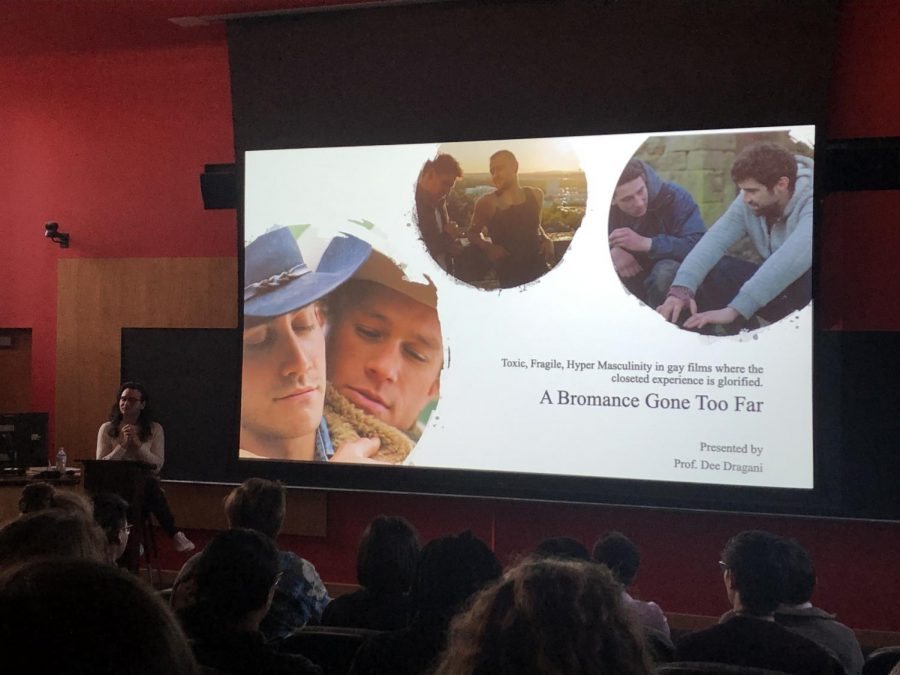Professor Presents Research on Toxic Masculinity
A large crowd of 50 showed up to an event on the portrayal of masculinity in gay films and media.
Dee Dragani, a visiting international scholar of Italian, presented her research on toxic masculinity among men and the gay community. Dragani focused first on masculine standards in the gay community, specifically straight-presenting men on gay dating apps and the exclusion of those who identify as non-white or feminine.
Dragani then explained her research on gay representation in film with mostly straight-presenting gays as protagonists and feminine-presenting gays in secondary and marginal roles.
She described three popular gay films – American film Brokeback Mountain, German film Freir Fall and British film God’s Own Country – as “The Perfect Bromance Film[s]” because of their hypermasculine contexts and over-sexualization of the characters. Dragani said instead the American film Moonlight had a “good representation” of a black, queer romance.
The presentation received positive remarks from audience members. Juliana Rhinehart ’22 said the talk was interesting and featured “things I haven’t really thought of before.” Rhinehart said, “I vaguely knew about the topic she was talking about, but not how deeply rooted they were.”
Erin Heeschen ’22 appreciated the “connection to common culture especially with the ‘masc4masc’ trend we see on apps like Grindr, which is really dangerous,” Heeschen said, referencing the phrase used by masculine gays to broadcast their exclusive interest in other masculine gays.
Heeschen said of film scenes that confuse intimacy and assault, “This kind of behavior is being normalized because this is the only media being produced about queer couples,” she said.
Ernest Entsie ’19, a pride coordinator for the office of LGBTQ services, said that Dragani’s presentation topic was often discussed in the office. “We see this on campus in discussions within our own communities…we see this on many forms of media,” he said.
Dragani’s presentation is part of her year-long independent research on masculinity in film. Dragani became interested in masculinity among the gay community when she watched the film Frier Fall.
“I started analyzing masculinity in the queer context and I realized that it was bad,” she said. Dragani wanted her audience to “see how bad masculinity is” and also wanted her younger audience to gain more knowledge on the topic to grow with it and for her older audience to “see this point of view.”
“My only goal is to make people think about…what is fearful on this topic, and why people are afraid to see the other side of the closet,” she said.
“A Bromance Gone Too Far? Toxic, Fragile Hyper Masculinity in Gay Films Where the Closeted Experience is Glorified” was hosted by the Office of LGBTQ services on Tuesday, March 19 in Althouse.






Rob • Mar 25, 2019 at 12:44 am
“Toxic masculinity” is hate speech.
This offensive label has two terms; the extreme negative “toxic” and the all of field “masculinity”. It does not describe the behaviours proposed as toxic, or suggest that masculinity could have any non-toxic characteristics or multiplicity. The literal meaning of the term associates all maleness with toxicity and is both offensive and demeaning. Suggesting some hiden meaning behind the term that cures it of offensiveness, is disingenuous at best, and more likely an expression of misandry.
Descriptions of other groups of people are couched in terms that are acceptable or adopted by the group. But when speaking about maleness, academia and the popular media consistently use terms that are negative, that many many men find offensive and that poorly describe the group or behaviours. Even overt hate speech such as “#killallmen”, is passed off as satire (I’m always amused when someone points out to me that hate speech is OK when it’s funny or satirical). Paradoxically, men who identify the term as offensive are further demeaned and belittled for their lack of traditional masculine insensitivity and are often escoriated for not being “tough”.
No-one has bothered to explain why insensitive, less empathic and demeaning terms are used in the media and academia when talking about men and maleness, when an entirely different more empathetic approach is used for other groups.
Refusal to acknowledge this inconsistency in language and approach, and the continued used of terms identified as offensive, reveals a entrenched culture of gender hatred, a culture that appears to be pervasive in our government, judicial, education and media sectors. Recent generations of men are growing up in this culture of gender hated of males, and will act consistent with being hated.